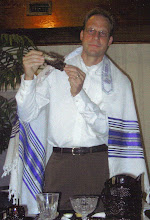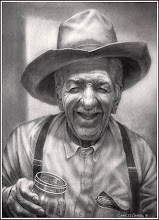Monday, March 30, 2009
Monday, March 23, 2009
GOD ON MUTE by Pete Greig

I appreciated what Greig said about our society's virtual denial (my words) about the difficulty of life. We have embraced a victim perspective and see ourselves as entitled to have "happiness" handed to us on a silver platter. This is one of the best books on prayer I have read since many of the classics like E.M. Bounds, and devotionals like Streams in the Desert. Our ancestors knew that life is difficult. They experienced death and suffering first hand, regularly, without the miracles of contemporary medical technology. They were not desensitized by violence and blood on television and in movies. They experienced those things first hand as they went about daily lives, slaughtering pigs, chopping heads off of pet chickens, and burying family members by hand. Life was hard, as it is for most of the rest of the world. Most of the poor folks I know are happier than those with lots of comforts and toys. Why is that?
Greig makes the point well: When life is viewed from the perspective of tough, the blessings of God, small and large, experienced daily in life are illuminated and amplified big time. Rather than blame God when tragedy strikes, or difficult times are had, those with a real perspective of the difficulty of life and suffering are able to see the good God is bringing out of the situation, and appreciate more resolutely the small blessings of life. We move forward through life, doing the best we can, clinging to Jesus, family and friends.
Yes, God is sovereign, but God gets blamed for way more than He deserves. I cringe when I hear people say: "well if God wants her, he'll take her." Life is difficult, and illness and death happen (now anyway). The hope we have though is that God is making all things new, and one day Jesus will wipe away every tear and take away pain and suffering. Until then, we walk through life with dignity, hope and joy able to withstand anything this life can throw at us, because God is with us, and God is good! Mystery? yes. Truth? yes, I believe.
Is virtual reality denial the contemporary darkness which the light of Christ must dispel?
Thursday, March 12, 2009
Season of Lent - Power of Silence

Lord Jesus, I want to remain centered in and focused in you. Not just during this time of Lent, but every moment of every day of my temporal existence here in this place. I want to walk step by step in your eternal joy, listening carefully to your teaching, watching closely your every move, becoming more and more who you created me to be. I want to be your disciple, to follow you any and everywhere. I want to be acutely aware of my alien status here in this place at this time, but also keenly sensitive to your calling and sending wishes as I do my best to serve, love, live fully. Lord Jesus, I am yours. Thank you for inviting me into your Presence. Help me to welcome others as willingly and freely as you welcome me to your Throne of Grace. I love you Lord, Father, Son and Holy Spirit. Help me to keep that in the forefront of all my being and doing. Amen.
Isaiah 53 (msg)
Who believes what we’ve heard and seen? Who would have thought God’s saving power would look like this? The servant grew up before God – a scrawny seedling, a scrubby plant in a parched field. There was nothing attractive about him, nothing to cause us to take a second look. He was looked down on and passed over, a man who suffered, who knew pain firsthand. One look at him and people turned away. We looked down on him, thought he was scum. But the fact is, it was our pains he carried – our disfigurements, all the things wrong with us. We thought he brought it on himself, that God was punishing him for his own failures. But it was our sins that did that to him, that ripped and tore and crushed him – our sins! He took the punishment, and that made us whole. Through his bruises we get healed. We’re all like sheep who’ve wandered off and gotten lost. We’ve all done our own thing, gone our own way. And God has piled all our sins, everything we’ve done wrong, on him, on him.
He was beaten, he was tortured, but he didn’t say a word.
Like a lamb taken to be slaughtered and like a sheep being sheared, he took it all in silence…
excerpt from: Henri J.M. Nouwen, “The Way of the Heart”
The Desert Fathers praise silence as the safest way to God. “I have often repented of having spoken,” Arsenius said, “but never of having remained silent (43).” Silence is an indispensable discipline in the spiritual life (44). Over the last few decades we have been inundated by a torrent of words. Wherever we go we are surrounded by words: words softly whispered, loudly proclaimed, or angrily screamed; words spoken, recited, or sung; words on records, in books, on walls, or in the sky; words in many sounds, many colors, or many forms; words to be heard, read, seen, or glanced at; words which flicker off and on, move slowly, dance, jump or wiggle. Words, words, words! They form the floor, the walls, and the ceiling of our existence. It has not always been this way. There was a time not too long ago without radios and televisions, stop signs, yield signs, merge signs, bumper stickers, and the ever-present announcements indicating price increases or special sales. There was a time without the advertisements which now cover whole cities with words. Recently I was driving through
Habakkuk 2:20 (msg)
“But oh! GOD is in His holy
Monday, March 2, 2009
Pacifism and Terrorism

Admittedly, this topic has and always will be a difficult road to navigate for followers of the Way. A nation that values security (like ours) must authorize its govt. to ensure that security in a way that will discourage terrorism from outside and within, while at the same time doing so with integrity and as humanely as possible. It is a delicate balance to say the least. I think that as long as our govt. is having to engage in these methods of protection for its citizens, the church can and should support those who offer themselves sacrificially for its neighbors. Yes, training is intense, and war is hell. But I would rather my child be trained intensely and prepared for the realities of combat than not. The question becomes for me, how can the church best assist this endeavor and help with the integrity and healing issues that come along with it. I support chaplaincy and think it vital that the church go out of its way to minister to returning vets in a positive, supportive, loving way. I also believe the church should be a supportive environment for those who have and are serving. Rather than demonizing those who have truly offered their lives for the citizens of their nation and often other countries, we need to celebrate their sacrifice and support them in reintegration so they can become healthy Christian leaders in society. We also need to help vets understand the differences between their patriotic beliefs (love of nation) from their Christian faith (love of God and neighbor) and help them theologically sort out a healthy paradigm for serving nation while ultimately serving God and neighbor.
As far as pacifism, I try by all means to be personally pacifistic. I don't fight as much as I did as a young boy and man (been a long time, thank goodness). But I will defend my family if they are under threat. I can not imagine someone hurting my wife or kids or someone under my care as a pastor, and standing idly by. Now, I am more apt to defend the defenseless than myself. There is power in telling someone that Jesus loves them when they are about to harm you. That may not seem Christian enough to some, but there it is.


















.jpg)


